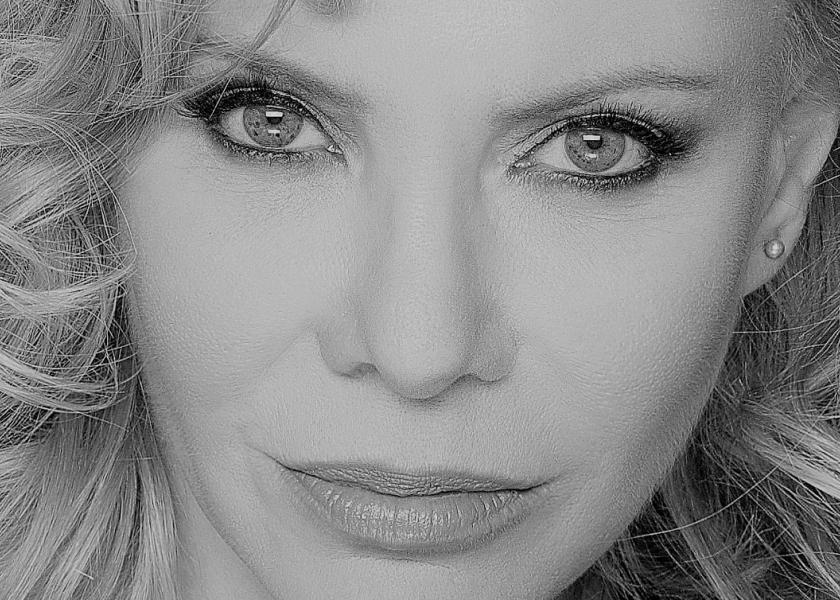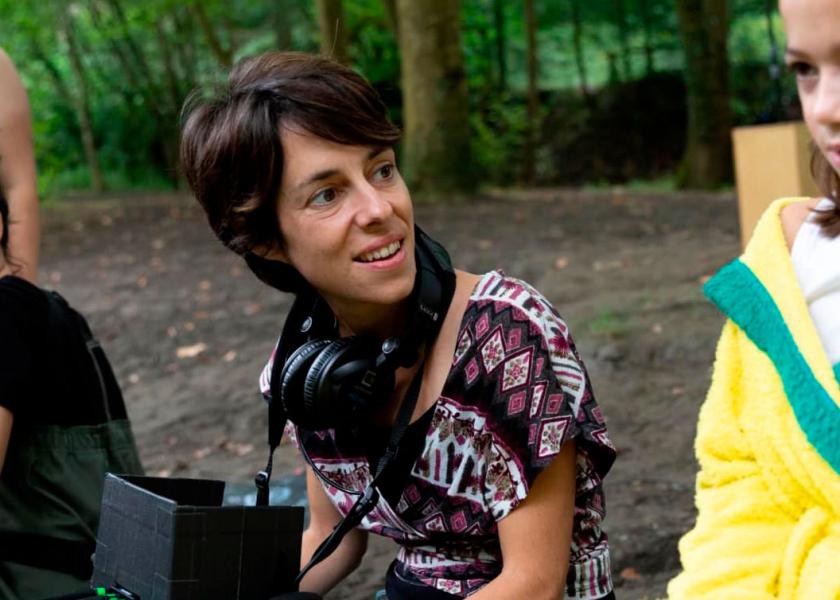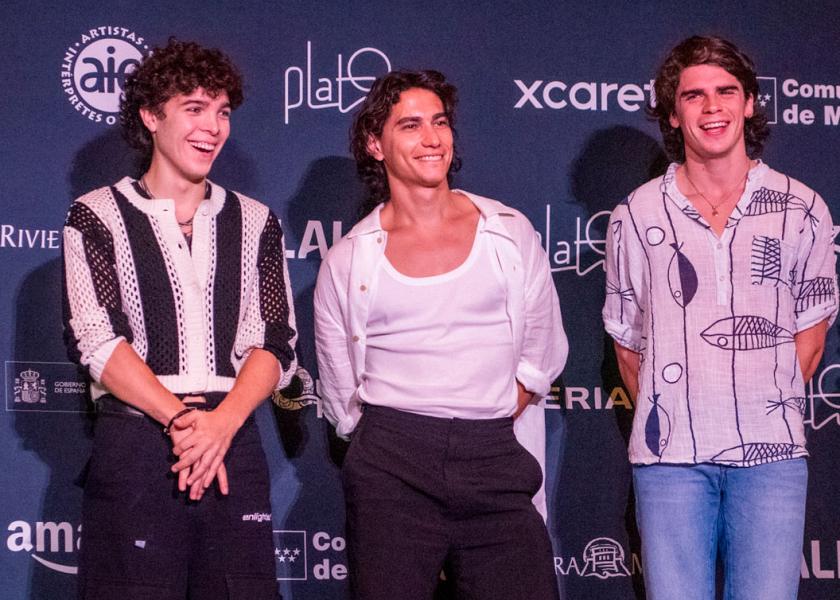Aislinn Derbez
Ibero-American pride

Mexican actress Aislinn Derbez will be one of the presenters of the 12th edition of the Platino Awards. Proud of this opportunity, she defends the growing influence of Ibero-American audiovisuals around the world. Belonging to a dynasty of actors, she grew up observing the talent of her grandmother, Silvia, and her father, Eugenio, but also actors like Javier Bardem or actresses like Penélope Cruz.
For Aislinn Derbez (Mexico City, 1986), presenting the 12th edition of the Platino Awards on April 27 is “a dream come true.” And she adds: “Being part of a ceremony celebrating our talent and our cultural identity is a privilege, and I love the idea of connecting with colleagues from around Ibero-America and recognising their work on such an important stage. It is a huge honour because these awards represent the best Ibero-American films and series.” This Mexican actress highlights the growing importance of the Platino Awards—sponsored by Iberia—, which “have become a landmark in the industry,” and the connections they foster between producers, directors, actors, and actresses: “These awards have garnered very successful coproductions, and have helped these reach new heights. They strengthen our industry and allow us to break down barriers and tell stories that reflect our cultural diversity.”
Aislinn knows what she’s talking about because, even though the bulk of her career has developed in Mexico, she has also taken part in productions in Spain (Noche de chicas or With the Years That We Have Left), Colombia (Broken Promises) or Chile (The Vineyard). Alliances are formed around a common language, Spanish, which allow the Ibero-American film troupe to transcend borders. When asked about Spain, this actress confesses: “I love to work in Spain, and I actually want to move to Madrid. I’d love to collaborate with Pedro Almodóvar because he’s one of the most influential directors in Spanish cinema. And act with colleagues like Javier Bardem or Penélope Cruz—I grew up watching them and admiring them, so much so that they inspired me to train as an actress—. Also with Carmen Maura, Álvaro Morte or Antonio de la Torre.” One of her most imminent projects, she reminds us, is connected to the country where, together with Asier Etxeandia, the Platino Awards ceremony is held: “Right now I’m in post-production for Hasta el fin del mundo, a film we shot in Spain and which I’m a producer of. It’ll be out really soon!”
“I’d dare to say that we’re at our best. There are increasingly more Ibero-American productions standing out at international festivals”
Aislinn shows as much passion for her work as for that of her colleagues and, when asked about her latest discoveries, she doesn’t take long to list the titles of several Ibero-American films and series: “I’m fascinated by the Brazilian film I'm Still Here for how it recreates the 1970s dictatorship and conveys that atmosphere of fear and oppression. Also, the Argentinian film Puan, which tells the story of a philosophy lecturer who competes for a chair at the University of Buenos Aires, and the Mexican film Pedro Páramo, an adaptation of the novel by Juan Rulfo. In terms of series, two more adaptations: Like Water for Chocolate, based on the novel by Laura Esquivel with an incredible cast of Mexican actresses, and One Hundred Years of Solitude, based on the novel by Gabriel García Márquez.” We pause on I'm Still Here, which recently received the Academy Award for Best International Feature Film, to delve into the current situation of Ibero-American audiovisuals: “We’ve evolved in many senses, and I’d dare to say that we’re at our best. There are increasingly more Ibero-American productions standing out at international festivals and a growing interest in our stories, as well as the greater quality of direction, script, acting...”

Aislinn Derbez’s passion for acting runs in her blood and comes from her grandmother Silvia and her father Eugenio. © Huuman Style (@huumanstyle)
A family saga
Aislinn belongs to a family dedicated to acting. She is the granddaughter of Silvia Derbez, the iconic Mexican actress who, in 2002, posthumously received the Medalla Filmoteca UNAM (National Autonomous University of Mexico) for her career, and the daughter of Eugenio Derbez, winner of the first Platino Award for Best Actor (2014) for his work on the film Instructions Not Included, and presenter of the Platino Awards in 2018. Her brothers, Vadhir Derbez and José Eduardo Derbez, are also actors and her little sister, Aitana Derbez, is already showing a passion for the stage at the tender age of ten. “My family has taught me to be creative, to develop my own ideas and to not sit back and wait for an opportunity to come—Aislinn declares—. I’ve learnt discipline, dedication, love, and respect for my grandmother’s art and, above all, that this career is a long-distance race.” But what is it like to bear such an important surname? “On the one hand, I feel proud, it has opened many doors and is my grandmother’s legacy. But at the same time, it has forced me to prove that I stand on my own two feet. I’ve struggled to build my own path, my own name, to distance myself from comparison and transcend certain expectations or prejudices. I also feel the pressure to live up to expectations and not let people down.” Acting is in Aislinn’s genes, but she doesn’t believe that talent is innate: “It’s a mix of passion, discipline, hard work, and authenticity. Without these four qualities, you cannot develop talent. Talent in itself is not enough. In fact, some people are more disciplined than talented, and they go farther because of that.”
“Talent is a combination of passion, discipline, hard work, and authenticity. Without these four qualities, you cannot develop talent”
This actress has recently starred in the series Between Walls (Disney +). “It’s a fun and cool story, but with an undercurrent that goes beyond comedy. It speaks of love in all its facets and, even though it’s a comforting series, it also makes you think. What I enjoyed the most about playing Marga was the opportunity to explore her vulnerability and her contrasts,” she affirms. What mark do characters like Marga leave on Aislinn? “Sometimes I play something that I’m experiencing in real life and others, the complete opposite. And that’s even more interesting because, when the characters are opposite to me, they push me to explore things I’d never dare in real life.” Aislinn, who works for both film and TV, defends the growing quality of Ibero-American series: “Before, we didn’t used to have the budget or the production level of markets like in North America, but now we can compete with other series globally. Also, platforms are betting on our stories and that allows Ibero-American productions that didn’t used to leave the country to now be exported and reach new audiences. Series have opened many doors for our talent.”


